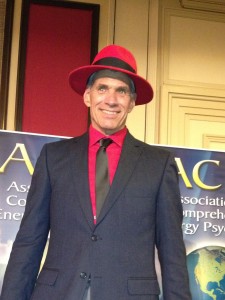Reprinted from:
The National Psychologist
The Independent Newspaper for Practitioners
Supporters Say Results show Energy Psychology Works
By Paula E. Hartman-Stein, Ph.D.July 24, 2013
 Speakers at the Association for Comprehensive Energy Psychology (ACEP) annual conference May 30-June 2 said the conference finally has become recognized for CE credits by the American Psychological Association for one simple reason: Energy psychology works.
Speakers at the Association for Comprehensive Energy Psychology (ACEP) annual conference May 30-June 2 said the conference finally has become recognized for CE credits by the American Psychological Association for one simple reason: Energy psychology works.
Opening speaker David Feinstein, Ph.D., said, "Psychologists are very true to their respect for research. There was resistance to energy psychology (EP) because bridges were burned by some of its early advocates, the technique looked so utterly strange and the explanatory models are outside the frameworks we learned in grad school. We now have excellent preliminary research of the efficacy of EP techniques."
Feinstein published a summary about EP in the Review of General Psychology in 2012 identifying 51 peer-reviewed studies that investigated clinical outcomes following the tapping of acupuncture points to address psychological issues. "There were 18 randomized controlled trials in the sample that demonstrated strong effect sizes."
Feinstein identified areas treated successfully with EP, such as Post Traumatic Stress Disorder (PTSD), phobias, generalized anxiety, depression, food cravings, physical pain and athletic performance. "We still need to do the head-to-head studies with cognitive behavioral therapy (CBT) before we can claim we are better than anybody else."
Feinstein said, "EP is not just a therapy but has wide application for business, achieving peak performance for athletes and for bringing out the best in employees. It is a-theoretical and can be used in any psychological framework."
Feinstein wore hats throughout the conference to cover bandages from surgery a month earlier to remove a subdural hematoma. "I am doing fine. I think energy psychology and energy medicine techniques had a lot to do with my speed of recovery that surprised the medical staff. I was in the hospital for two nights after the surgery and usually recovery time spent in the hospital is five days to two weeks."
APA recognition means that 100 psychologists among 500 health pro-viders attending the conference could obtain CE credits for the first time in the conference's 15-year history.
"After years of controversy with the APA, ACEP became an official provider of CE for psychology in November 2012. APA has not approved energy psychology, but they approved us. The ban is broken," said Robert Schwarz, Psy.D., ACEP's executive director.
Schwarz said years ago a controversy erupted between APA and proponents of Thought Field Therapy (TFT), an energy psychology technique developed by psychologist Roger Callahan, Ph.D., initially used to treat phobias. He said in 1997 APA sent out a memo to CE providers that they could not teach TFT courses for CE credit. "There was a major push in the APA to go with evidence-based treatments, and TFT did not have much evidence at the time."
ACEP President Debby Vajda, LCSW, said, "ACEP was formed in 1999 and is an umbrella organization of 1,300 members consisting of social workers, counselors, psychologists, energy healers, physicians and nurses." ACEP offers certification for licensed mental health professionals and non-licensed energy health practitioners. Schwarz said psychologists make up 25 percent to 30 percent of the members.
This year's conference offered workshops on topics such as the integration of ancient energy healing movements, such as Qi Gong and yoga into psychotherapy, tapping on acupressure points for neck and shoulder pain and integrative medicine and energy treatments for PTSD in veterans.
Speakers included former Harvard psychologist and cell biologist, Joan Borysenko, Ph.D., who presented on the science and psychology of ancient wisdom, and William Tiller, Ph.D., professor emeritus at Stanford, on why orthodox medicine is unable to integrate psychotherapy and the healing arts.
The closing speaker was Eben Alexander, M.D., neurosurgeon and author of the New York Times best selling book, Proof of Heaven, a description of his near-death experience during six days in a coma due to bacterial meningitis. A holistic psychiatrist from Harvard, Eric Leskowitz, M.D., said, "For me, Dr. Alexander's talk was the most compelling presentation of the ACEP conference. His combination of humor, wisdom, academic intellect, insight and compassion is quite powerful, and he is an important voice in today's emerging cultural transformation."
Larry Stoler, Ph.D., past president of ACEP, who presented on Qi Gong as a daily practice for health care professionals, summarized his ideas about the future of energy psychology. "EP itself is a grassroots movement that ultimately is bigger than our professional identity as psychologists. It is about human beings reclaiming something that we all have the ability to do, that is, natural healing. It's time for us as individuals to recognize how much we can help to heal ourselves. This is also a totally and deeply felt direction in areas of mainstream psychology. If that grows, then the energy psychology movement will be a significant contributor to it."
To learn more about ACEP, go to www.energypsych.org.